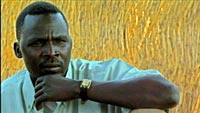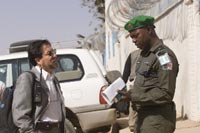In February 2003, after years of economic, political, and social hardship, the tribes people of Sudan, the geographically largest nation in Africa, staged a rebellion against their government. These corrupt officials in turn armed the Arab “Janjaweed” militia to destroy civilian populations believed to support the rebels. In 2004, the U.S. government declared genocide in Darfur, a historic move, as such conflict had previously never been declared genocide while the strife was still ongoing.
Four years after the rebellion began and three years after that landmark declaration, where do things stand? Darfur Now attempts to answer that question by introducing us to six individuals fighting the genocide in various capacities around the world. Adam Sterling is a student activist who lobbies to keep California state monies from companies that fund the Sudanese government (an economic strategy called divestment). Luis Moreno-Ocampo, prosecutor of the International Criminal Court (where the U.N. Security Council referred the situation in Darfur in 2005), gathers evidence against those in power believed responsible for the atrocities. Don Cheadle, the American actor who gained interest in the region while filming 2004’s Hotel Rwanda, uses his star power to raise public awareness and to gain access to foreign governments with fellow actor/activist George Clooney. Pablo Recalde, leader of the World Food Program Team in Darfur, organizes risky distribution of needed supplies throughout the war-torn region. Ahmed Mohammed Abakar, chief sheikh of the Hamadea displacement camp, tries to keep order and peace among the 47,000 refugees living there. And Hejewa Adam, who became a rebel fighter when her infant son was beaten to death on her back, guards the region with both desperation and defiance. In between these six people’s stories, we receive firsthand accounts from Sudanese people who can barely speak aloud the atrocities they’ve seen and experienced.
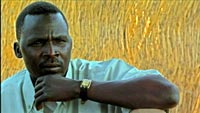
Director Ted Braun told Newsweek, “Documentaries have for almost their entire tradition been used as part of activist agendas and agents of social change. While I wanted to help provoke a change in the world’s attention to the Darfur situation, my agenda as a filmmaker was to invite my audiences to understand and experience my subjects as human beings first.” This firsthand look at both the genocide and the fight against it is the movie’s greatest strength. Between startling statistics flashed on the screen—such as the fact that since the conflict began, 200,000 Sudanese have been killed and another 2.5 million displaced—we watch the daily realities and tireless efforts of these six individuals. Their passion, fear, frustration, sacrifice, and triumph pull us in to a subject that can often feel too big and complicated to engage.
Not only does Braun use personal story to draw us in, he gives us three specific story arcs to navigate us through the larger battle. We watch Adam Sterling push AB 2941, a California law to prevent state funds from being invested in companies with Sudanese oil interests. We observe Luis Moreno-Ocampo painstakingly gather evidence to secure arrest warrants from the International Criminal Court for top Sudanese officials. And we see Pablo Recalde send a large convoy of food supplies across many dangerous miles to meet a huge need in the northern region of Sudan. It’s both helpful and important to be given these specific mile markers to look for while simultaneously learning how very long and difficult the overall journey is. And throughout these macro and micro journeys, Braun pauses just long enough to keep the human element alive by focusing on small details: dusty feet, deserted huts, colorful clothing, children’s drawings of men with guns, tear-stained faces, triumphant smiles.
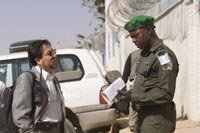
Darfur Now actually began with Dean Schramm, a Hollywood agent and member of the American Jewish Committee (AJC). Frustrated by his feelings of powerlessness against the genocide in Darfur, Schramm brainstormed the idea of a documentary, which he proposed to his client, director/writer Braun (who also wrote and directed We’re Here to Speak for Justice, a documentary about battling for the rights of the developmentally disabled). Together Schramm and Braun worked with AJC’s Gary Greenebaum, a rabbi and political activist, to secure a $100,000 grant from the Righteous Persons Foundation, Steven Spielberg’s nonprofit.
A large portion of that money was spent on insuring the crew as they filmed armed rebels in unstable territory. Not only did the producers have to work tirelessly to convince companies to insure the crew, they also had to convince the Sudanese government to let them film. In a planned two-week research trip that turned into three months, Braun spoke to leaders of nearly 100 tribes in Darfur. After all that, he also had to fill out reams of paperwork for the U.S. Treasury in order to attempt to make money off a project filmed in an embargoed country. To say this movie was a labor of love would be a bit of an understatement.
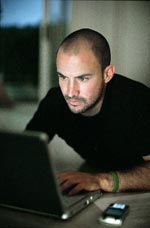
Given the religious roots of the film, I was surprised that faith didn’t play much of a role throughout. Despite some news reports to the contrary, those interviewed in Darfur Now do make it clear the genocide is a power play (of government vs. civilians) rather than a religious battle. They underscore this conflict is by and large Muslims killing Muslims and not Muslims killing animists or Christians (who comprise 25 percent and 5 percent of the population, respectively). However, we never hear any of those interviewed citing their faith as a driving factor in their fight against such evil. While Pablo Recalde winningly calls his work “part of my responsibility as a human being,” no one talks about his or her responsibility as a person of faith. I’m left wondering where Christians (or Jews or other people of faith) factor in the battle against the genocide. I know they’re out there faithfully fighting this huge evil; that part of the equation simply isn’t shown here.
After the screening I attended, Adam Sterling shared with our audience that it was one college class (on African politics) that transformed him from an apathetic non-voter into a fulltime activist. When he attempted to form a student group in 2004, only four people showed up at his first meeting. Now he’s helped launch a national divestment movement (http://www.DivestForDarfur.org), with legislation now passed in 12 states. Talking about his surprising role in this epic battle, Sterling quoted Martin Luther King, Jr., “We don’t have to see the entire staircase to take the first step.”
Hopefully, well-crafted and moving films such as Darfur Now will inspire more people to take that small but significant movement.
Get Involved
Participate.net—find information about the six people featured in the movie and steps you can take in each of their areas of work
Divestfordarfur.org—learn more about divestment and sign a petition calling investment firms to divest from companies that help fund genocide in Darfur
Savedarfur.org—receive up-to-date news on the situation in Darfur as well as information on events and rallies nationwide
1-800-GENOCIDE—hear talking points on Darfur issues before being connected to your elected officials
Talk About It
Discussion starters- How do Richard Pimentel’s actions mirror those of Christ? Give examples.
- Have you ever been guilty of walking past someone with a disability and seeing only their handicap and not someone created in God’s image? How do we get past that?
- In the latter half of Darfur Now, Richard becomes so obsessed with his job helping others, that he neglects himself and his own relationships. How does one balance ministering to others and caring for our first and foremost responsibility—our families?
- Read Matthew 25:34-40, Isaiah 42:3, and Micah 6:8. How do these verses apply to the way we treat those with disabilities? Do Christians have any sort of obligations toward the disabled? If so, how might we act on those obligations?
The Family Corner
For parents to considerDarfur Now is rated PG for thematic material since the movie is all about the killing of innocent civilians. Most of the violence is implied, but we do hear discussions about rape and torture and also see childrens drawings of disturbing violence. Many of the political and legislative issues would be confusing and/or boring to most children. Obviously not for younger audiences, Darfur Now could be a good introduction to important world events for mature older teens.
Photos © Copyright Warner Independent
Copyright © 2007 Christianity Today. Click for reprint information.

